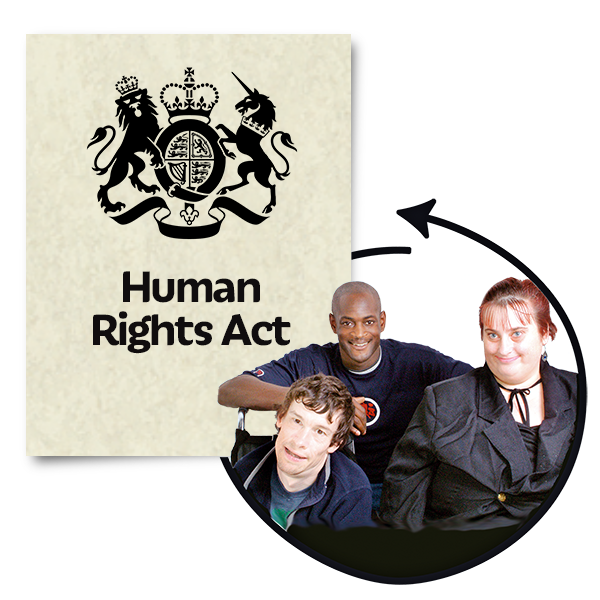Mencap and the
Challenging Behaviour
 Challenging behaviour can be when someone hurts themselves, hits or pinches someone else, or breaks something. Some people might behave like this because they are upset or because people do not understand them.
Foundation respond to latest NHS Digital figures which show an increasing number of people with a
learning disability
Challenging behaviour can be when someone hurts themselves, hits or pinches someone else, or breaks something. Some people might behave like this because they are upset or because people do not understand them.
Foundation respond to latest NHS Digital figures which show an increasing number of people with a
learning disability
 A learning disability is to do with the way someone's brain works. It makes it harder for someone to learn, understand or do things.
and/or
autism
A learning disability is to do with the way someone's brain works. It makes it harder for someone to learn, understand or do things.
and/or
autism
 Autism is a disability. Autistic people find it difficult to understand what other people think and feel. They also find it difficult to tell people what they think and feel. Everyone with autism is different.
locked away in these modern-day asylums, where they are at even greater risk during the coronavirus pandemic.
Autism is a disability. Autistic people find it difficult to understand what other people think and feel. They also find it difficult to tell people what they think and feel. Everyone with autism is different.
locked away in these modern-day asylums, where they are at even greater risk during the coronavirus pandemic.
Mencap urges Government “not to use coronavirus crisis as an excuse to let this domestic
human rights
 Human
rights
Human
rights
 Rights are the things everyone should be allowed to do like have a say, or go to school.
are the rights that everyone has. These include the right to go to school and the right to start a family.
scandal continue”.
Rights are the things everyone should be allowed to do like have a say, or go to school.
are the rights that everyone has. These include the right to go to school and the right to start a family.
scandal continue”.
- At least 2,060 people with a learning disability and/or autism still locked away in inpatient units as charities warn they are at even greater risk during coronavirus crisis – up from 2,045 last month
- 200 children with a learning disability and/or autism are still locked away in inpatient units – up from 190 last month
- People with a learning disability and/or autism continue to be locked away during lockdown – 80 admissions in May 2020
Edel Harris, Chief Executive of the learning disability charity Mencap, said:
“We have long been warning that lockdown must not mean more people being locked up. Yet today’s figures show an increasing number of people with a learning disability and/or autism locked away in these modern-day asylums, where they are at risk of abuse and neglect. With family contact cut and CQC inspections reduced during lockdown, many families are rightly terrified about what might be happening to their loved ones behind closed doors.
“The steady stream of admissions and continued delayed discharge shows the desperate need for appropriate social care support in the community
A community is the people and places in an area. – the only proper alternative to inpatient units. While the increased costs of delivering social care alongside emergency funding not always reaching frontline services means that this gap is only likely to become greater as more people are left to reach crisis point because they cannot get help at home.
“People with a learning disability and/or autism have a right to live in homes not hospitals. The Government
The Government are the people who run the country. The Government decide how much tax people should pay and how things like the National Health Service (NHS) should work. must not use the coronavirus crisis as an excuse to let this domestic human rights scandal continue. Now more than ever, we need a robust cross-government strategy
A strategy is a plan to show what an organisation
An organisation are a group of people who work together. , or a person, wants to do and how they are going to do it. and investment in a reformed social care system to stop inappropriate admissions in the first place and get people out of inpatient units and back into the community.”
- Delayed discharges continue with at least 120 people still stuck in hospital when they are ready for discharge in May 2020
- The average total length of stay in inpatient units is 5.7 years.
- 3,265 recorded instances of restrictive interventions (like physical, prone, mechanical and chemical restraint) being used in one month, of which 570 were against children. This is likely to be just the “tip of the iceberg” as only data for 3 out of 14 private/independent providers and 27 out of 55 NHS providers.
Vivien Cooper OBE, CEO of the Challenging Behaviour Foundation, said:
“The data published today shows that there is a concerning increase in the number of children and adults in inpatients units. People with learning disabilities in inpatient units are at high risk of abuse and the Joint Committee on Human Rights report published last week concluded that this risk is even greater in the current Covid crisis. The report cites increased risks of violations to a number of human rights, including the right to life, freedom from inhuman and degrading treatment, liberty and security, respect for family life and non- discrimination
Discrimination is when someone is treated differently (usually in a bad way) because of things like their disability or their religion
Religion is to do with the things you believe about the world. For example you may believe there is a god or something else. Examples of religions are Christianity, Hinduism, Islam and Judaism. . .
“Since Winterbourne View in 2011, the Government, NHSE and CQC have all made commitments time and time again to Transform Care, yet, now when the stakes are higher than ever, they continue to fail to do so and far too many people remain in inpatient units at risk of abuse.
“Health, education
Education is when you learn things. When you fill in a form to get a job, education means you write where you went to school, college or university. , and social care need to work together now to address the issues and protect the rights of children and adults with learning disabilities. We hear a lot about the “new normal”- this provides an opportunity to ensure that children, adults and their families get the right support in the right place at the right time. This must happen now, with robust delivery plans across Government Departments and clear lines of accountability to ensure the right support is available at the right time in the community.”
See the full report via NHS Digital here.
-ENDS-
For further information or to arrange interviews, contact Mencap’s media team on:
- media@mencap.org.uk
- 020 7696 5414 (including out of hours).
Notes to editors
- Mencap and The Challenging Behaviour Foundation have been campaigning with families on these issues since the abuse scandal at Winterbourne View nine years ago.
- The Assuring Transformation data from NHS Digital is the most accurate and up to date account of people with a learning disability and autism in institutions. It is a record of how many are in an institution, how long they have been in for, when their care and treatment is checked and what kind of unit they are in. Latest data shows that numbers have fallen from 2,260 at the end of March 2019 to 2,060 at the end of May 2020.
- Figures for restrictive practices quoted from NHS Digital MHSDS Data: March 2020, published June 2020. For more information see NHS Digital data.
- In the tables for restrictive practices we cannot distinguish between ‘less than 5’ and ‘missing data’, so we have to treat this all as missing data.
- Mencap and CBF are asking the Government to focus on:
- developing local expertise, support and services
- ensuring there is joint oversight and ownership of the national programme by the Ministers from the Department of Health and Social Care, Department of Housing, communities and Local Government and Department for Education.
- removing the red tape and funding barriers that are preventing so many people from returning home.
- there remains no robust plan from leadership for cross-government working.
About Mencap
There are 1.5 million people with a learning disability in the UK. Mencap works to support people with a learning disability, their families and carers by fighting to change laws, improve services and access to education,
employment
 Employment means having a job.
and
leisure
Employment means having a job.
and
leisure
 Leisure is when you have time to do things you enjoy like playing sports or going to the pub.
facilities. Mencap supports thousands of people with a learning disability to live their lives the way they want.
Leisure is when you have time to do things you enjoy like playing sports or going to the pub.
facilities. Mencap supports thousands of people with a learning disability to live their lives the way they want.
Visit www.mencap.org.uk.
For advice and information about learning disability and Mencap services in your area, contact Mencap’s freephone Learning Disability Helpline on 0808 808 1111 (9am-3pm, Monday-Friday) or email helpline@mencap.org.uk.
What is a learning disability?
- A learning disability is a reduced intellectual ability which can cause problems with everyday tasks – for example shopping and cooking, or travelling to new places – which affects someone for their whole life;
- Learning disability is not a mental illness or a learning difficulty, such as
dyslexia
 Dyslexia is a learning difficulty. People who have dyslexia can find it hard to read, write and spell.
. Very often the term ‘learning difficulty’ is wrongly used interchangeably with ‘learning disability’;
Dyslexia is a learning difficulty. People who have dyslexia can find it hard to read, write and spell.
. Very often the term ‘learning difficulty’ is wrongly used interchangeably with ‘learning disability’; - People with a learning disability can take longer to learn new things and may need support to develop new skills, understand difficult information and engage with other people. The level of support someone needs is different with every individual. For example, someone with a severe learning disability might need much more support with daily tasks than someone with a mild learning disability.
About The Challenging Behaviour Foundation
The Challenging Behaviour Foundation (CBF) is a charity which exists to demonstrate that individuals with severe learning disabilities whose behaviour challenges can enjoy ordinary life opportunities when their behaviour is properly understood and appropriately supported.
The CBF supports families across the UK caring for individuals with severe learning disabilities. Information and support around understanding challenging behaviour and supporting behaviour change is provided through a range of written and DVD resources, email networks, family linking scheme, and through individual telephone support.
For more information about the CBF’s work on restraint and seclusion:
- visit www.challengingbehaviour.org.uk/driving-change/restraintandseclusion.html
- visit www.challengingbehaviour.org.uk
- email info@thecbf.org.uk
- phone 01634 838739.